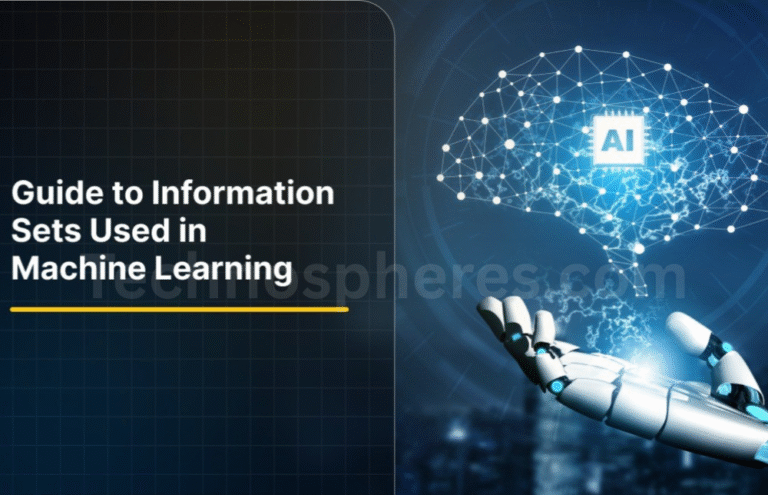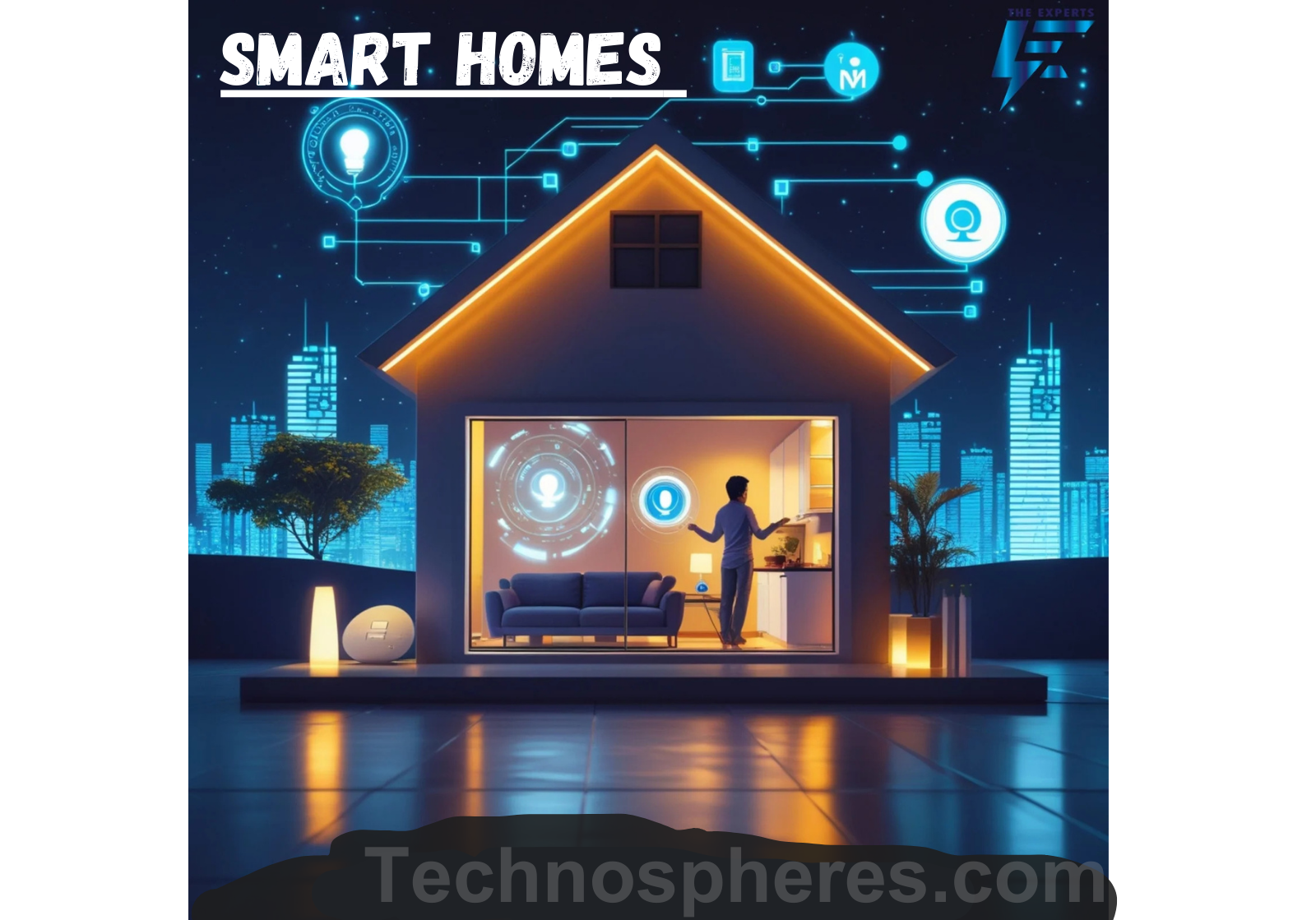
Smart Homes Using AI in India Opening up New Possibilities
Smart Homes Using AI in India Opening up New Possibilities using devices and equipment installed which simplify processes and enable easier living, security, and energy efficiency. Smart homes featuring AI in India are broadening opportunities by capitalizing on high-level machine learning algorithms and internet of things connections to create more customized, productive, and safer living environments.
Such gadgets are integrated on the Internet of Things (IoT) network and can be controlled remotely via smartphones, voice instructions, or unified controllers. Smart home innovations encompass programmed lights, intelligent temperature controllers, safety cameras, speech-operated aides, and aware devices that make themselves conversant with consumer lifestyle and automatically get modified accordingly in order to gain optimum functionality.
Artificial Intelligence in Smart Home Technology
Artificial Intelligence plays an integral function in smart home technology since it makes it possible to automate, personalize, and make decisions. The main sectors where AI is being used in smart homes are:
- Personalized Automation: Artificial intelligence technology learns users’ usage patterns and behaviors to manage room climate, lights, and entertainment options automatically.
- Voice and Gesture Control: Digital assistants with artificial intelligence, including Amazon Alexa, Google Assistant, and Apple Siri, are offering voice command capability to provide voice command functionality to allow voice command operation for controlling homes in a customized manner.
- Energy Efficiency: AI tailors energy usage to suit patterns by making changes in heating, cooling, and lighting as per demand.
- Security and Surveillance: AI-based facial recognition, anomaly detection, and predictive analytics security systems offer enhanced home protection.
- Smart Appliances: Every home appliance such as washing machines and refrigerators comes with AI pre-installed that make it more efficient through energy-saving recommendations and maintenance steps.
Emergence of Smart Homes Using AI in India Opening up New Possibilities in Market
AI-Powered Smart Home Solutions
Artificial intelligence has made smart home technology more adaptable and intuitive. Some of the most influential AI-enabled smart home innovations are:
- Smart Helpers: Intelligent voice-controlled assistants like Alexa, Siri, and Google Assistant manage home functions, remind us about things, and provide live information.
- Smart Appliances: Refrigerators that are technology-enabled show grocery lists, washers change the wash cycle, and robots vacuums glide and sweep effortlessly.
- AI-Security Systems: Motion sensing, strange behavior alerts, and face recognition provide enhanced security via live messaging and web monitoring.
Smart Speakers (Alexa, Google Home, Siri)
Smart speakers like Amazon Alexa, Google Assistant, and Siri from Apple are voice-assisted artificial intelligence-enabled devices that assist the users in doing several things with natural language processing (NLP).. The assistants can control smart home devices, respond to queries, remind, play songs, and deliver real-time information regarding weather, news, etc.
Functionality:
- Hands-free operation through voice recognition.
- Interoperability with smart home systems for effortless management.
- AI-based learning enhances personalization over a period of time.
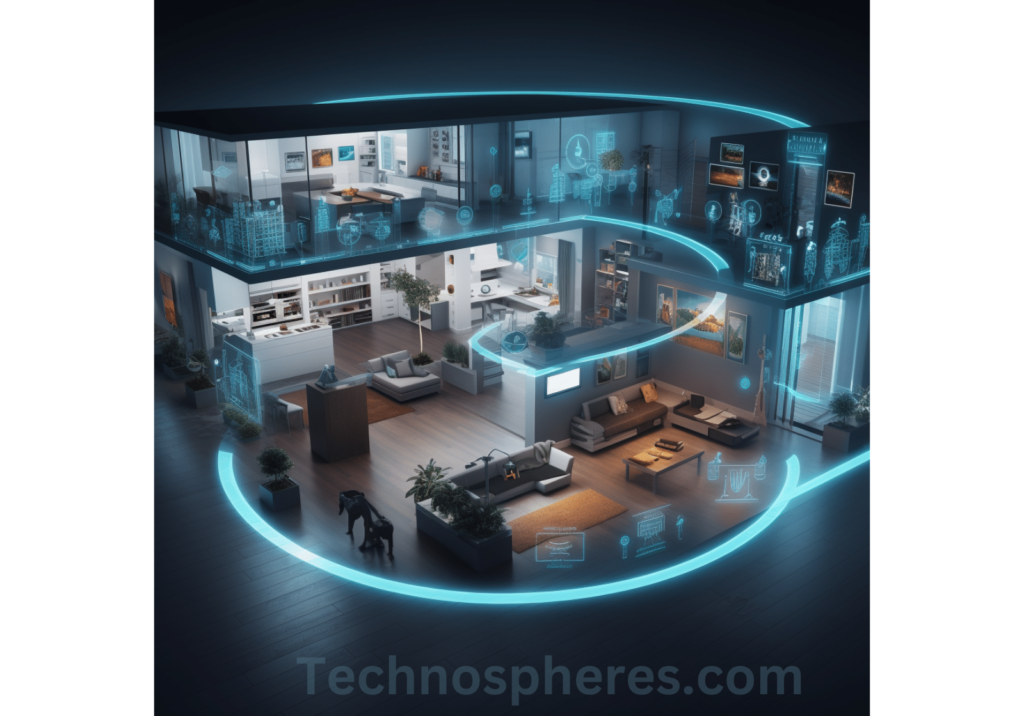
Use Cases:
- Controlling lights, Thermostats, and security systems.
- Reminding, updating the calendar, and alarming.
- Providing entertainment features such as playing music, audiobooks, and podcasts.
Advancements:
- Enhanced NLP for more natural-sounding conversations.
- Multi-user recognition for customized experiences.
- More advanced privacy features to safeguard user information.
AI-Powered Security Systems in Smart Homes Using AI in India Opening up New Possibilities
Artificial intelligence-enabled security systems deploy machine learning, facial recognition, and behavior detection to provide upgraded home security. They are more effective than traditional alarms and cameras because they have the ability to distinguish between usual activity and threat.
Features:
- Facial Recognition: Identifies familiar faces and alerts homeowners to strangers.
- Motion Detection & Behavior Analysis: Discriminates between human movement and non-treat actions like pets Patrolling.
- Automated Alerts: Generates alerts based on unusual behavior, reducing false alarms.
Benefits:
- Enhanced security threat detection accuracy.
- Real-time alerts via smartphone apps.
- AI-powered automation of security actions, for instance, closing doors or raising alarms.
Examples:
- Ring, Nest Cam, and Arlo AI-enabled security cameras.
- Two-way communication with AI-enhanced doorbell cameras.
- Smart locks that provide entry based on face recognition or voice verification.
Automated Energy Management
AI-powered energy management systems maximize the use of power in smart homes, preventing wastage and minimizing electricity bills. Such systems apply machine learning to understand the behavior of energy usage and make adjustments accordingly.
Key Components:
- AI-Regulated Lighting Systems: Brighten and shut down unnecessary lights intelligently.
- Smart Thermostats: Thermostats such as Nest and Ecobee regulate temperature on the basis of presence and preference.
- Energy Monitoring Devices: Offer real-time energy usage feedback.
Benefits:
- Minimizes electricity bills by optimizing consumption.
- Improves convenience through climate control automation.
- Contributes to sustainability by reducing waste.
How It Works:
- AI adapts user habits and changes heating, cooling, and lighting automatically.
- Relies on sensors and occupancy to make adjustments in real-time.
- Works with renewable energy systems such as solar panels for efficient use of power.
Advantages of artificial intelligence in smart houses
AI technology improves intelligent home operation in several ways by making residences more secure, efficient, and clever.
Ease of use:
- By automating daily operations, manual effort is cut down.
- Voice control and remote control offers make managing gadgets easier.
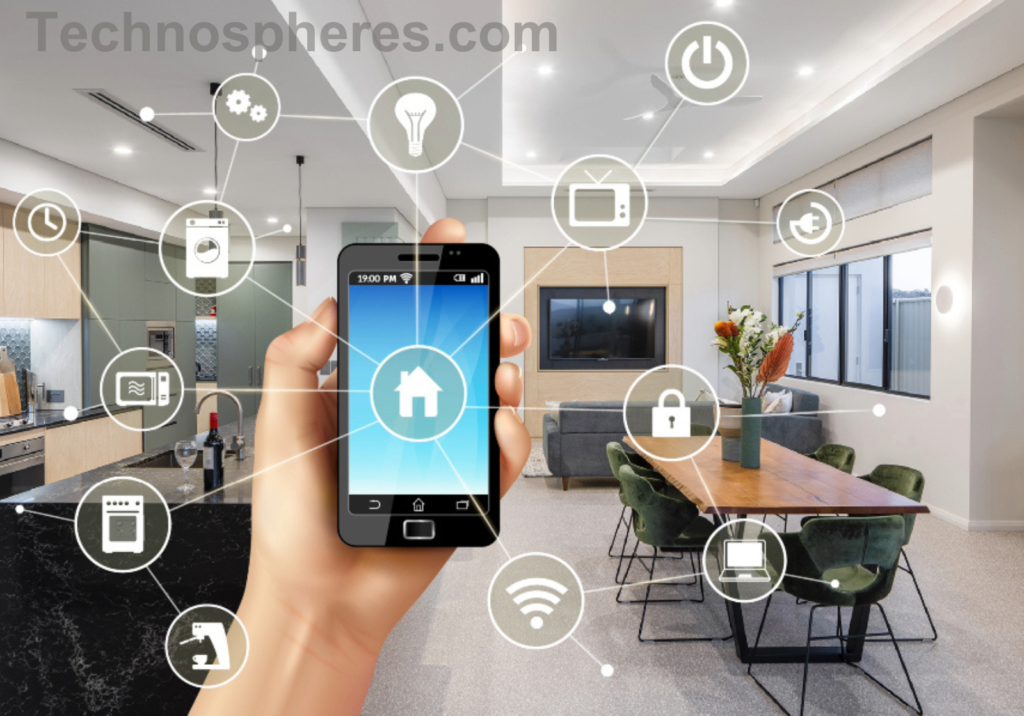
Economizing on energy and cost:
- By optimizing power usage, artificial intelligence helps to cut down on energy expenditures.
- Predictive maintenance stops costly failure of devices.
Better Security & Safety:
- Artificial intelligence powered cameras, alarms, and locks enhance house protection.
- Detects intrusions as well as gas leaks and fires.
Personalization & Adaptability:
- Based on user patterns of behavior AI learns and adjust.
- Personalizes entertainment, lighting, and climate control settings.
Sustainable practices:
- Helps to lower energy waste and carbon emissions.
- Encourages the integration of renewable energy, including wise solar energy use.
Smart home systems run on artificial intelligence are revolutionizing domestic management by raising security, optimizing energy consumption, and enhancing overall comfort. Ongoing IoT and artificial intelligence advancements in decades to come will make smart homes more intuitive, individualized, and efficient.
Improved security and observation.
By combining smart cameras, motion sensors, and automatic security procedures, artificial intelligence driven security and surveillance systems have transformed home security. Improved threat identification and reduced number of false signals result from machine learning and facial recognition in these systems.
Main features:
- AI driven cameras can identify known individuals and spot burglars.
- Differentiate environmental conditions, pet activity, and human movement by means of smart motion sensors.
- Automated Alerts & Notifications: Send real time notifications to homeowners via smartphone applications.
- Voice controlled security systems: linked with intelligent assistants such Google Assistant or Alexa participate with.
Benefits:
- Live video feeds from anywhere are available to homeowners using real time monitoring.
- AI is able to identify questionable actions and activate alarms prior to a burglary happening, thereby aiding in crime prevention.
- Lock/unlock doors, activate/deactivate alarms, and communicate through smart doorbells are managed remotely.
- Stores and processes video for more accurate security ideas.
AI Security Systems Examples:
Present real time alerts and facial recognition among Ring and Nest Cameras.
For instance, Ring Video Doorbell: offer bidirectional communication and motion detection based on artificial intelligence.
Grant access based on fingerprint or facial recognition: Biometric Smart Locks.
Energy Efficiency and Cost Reductions
Using artificial intelligence driven energy management techniques lowers energy use, cuts waste, and drops utility bills. Using machine learning and predictive analytics, these platforms can handle usage patterns and provide instant changes.
Important aspects:
- Smart Thermostats: Products such Nest and Ecobee learn user preferences and change thermostat settings correspondingly.
- Automatically darken lamps in empty rooms and vary brightness according to daylight availability using artificial light systems.
- With energy consumption calculators, one can get thorough information on domestic energy use and ideas for waste reduction.
Advantages:
- Artificial intelligence saves money by maximizing temperature control, lighting, and energy.
- Reduced Carbon Footprint: Minimizes energy waste, supporting sustainability.
- Renewable Energy: By means of artificial intelligence, usage of solar energy and battery storage is maximized.
- Intelligent systems close off low power consumption, hence stopping devices from just sitting around and using electricity.
Artificial intelligence products :
Energy saving artificial intelligence products include the following:
- Home energy use is managed by Tesla Powerwall and solar energy is stored effectively.
- Philips Hue Smart Lights enable users to lower power consumption by changing color temperature and brightness.
- Google Nest Thermostat: Learns everyday patterns and perfects heat and cooling.
Convenience as well as Customization
By learning user’s preferences to produce a very custom experience and automating daily house activities, artificial intelligence improves convenience.
Customization possibilities:
- With voice activated intelligent assistants (Alexa, Siri, Google Assistant) users might control devices handsfree.
- Based on user behavior, AI based predictive learning modifies entertainment, temperature, and lighting.
- Users can schedule devices to turn on coffee makers in the morning or lower lights in the evening.
Pros:
- Handsfree operation is made possible by voice instructions and less manual control required.
- Cohesive experience: Smart devices interact for a seamless integration.
- Entertainment Customization: AI powered TVs and speakers recommend content based on viewing and listening history. Find out more.
- AI powered fridges monitor food inventory and recommend recipes depending on ingredients already present.
- For home automation, use voice activated control: Amazon Echo & Google Nest Hub.
- Samsung Family Hub Refrigerator: Recommends menus depending on available ingredients.
- Suggest material according user preferences: AI driven Smart TVs (e.g., LG ThinQ AI).
Customer satisfaction with smart home products varies across categories:
| Smart Device | Net Promoter Score (NPS) | Customer Satisfaction Level |
| Smart Bulbs | 72 | Strong customer satisfaction |
| Smart Plugs | 66 | Positive consumer experiences |
| Smart Air Purifiers | 85 | Exceptional acceptance and satisfaction |
Central Market Trends:
- In cities, popular components are alarm systems, biometric locks, and AI powered security cameras.
- Government programs supporting energy conservation are driving the acceptance of smart lighting and thermostats.
- In Indian homes, products like Amazon Echo and Google Nest are growing in popularity.
- Expansion of IoT Ecosystem: Many more Indian companies are incorporating artificial intelligence into home gadgets including air conditioners, washing machines, and refrigerators.
Adoption issues:
- Smart home devices are rather high priced for middle income families.
- AI driven automation, which is still a challenge in some places, absolutely depends on dependable broadband.
- Users are concerned about artificial intelligence monitoring and data protection.
Future of Smart Homes Using AI in India Opening up New Possibilities:
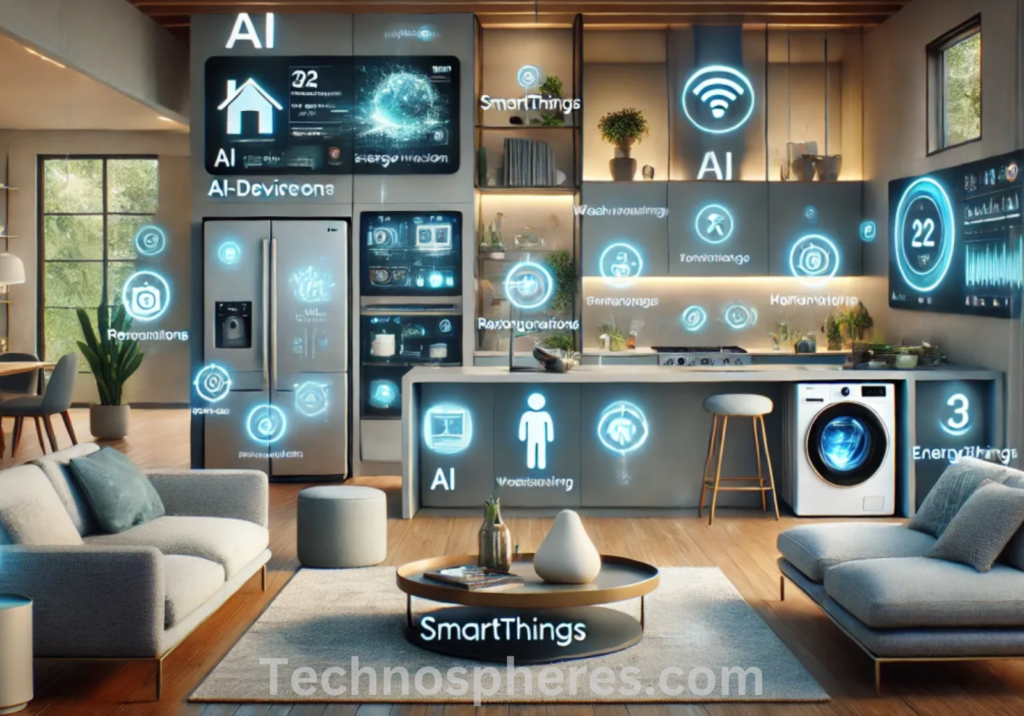
- With government initiatives such digital infrastructure and smart city projects, smart home acceptance should rise.
- Rising Consumer Awareness: More homeowners are starting to appreciate how artificial intelligence can assist them save energy and improve their level of security.
- Budget friendly AI driven goods are being introduced by businesses to meet middleclass customers.
- Significant Businesses in India Driving Smart Home Implementation:
- Tata Power Solar & Luminous: advances energy management based on artificial intelligence.
- Havells & Syska: Best in home automation and smart lighting.
- For inexpensive AI integrated smart house items, Xiaomi and Samsung present.
Driven by developments in technology and rising consumer demand, the artificial intelligence smart home sector in India has been seeing strong expansion. The present market size, growth forecasts, well known companies and startups, consumer awareness and acceptance rates, as well the difficulties and constraints in this sector are all discussed in depth below.
| Category | Details |
| Market Size (2023) | ₹8,000 crore (Smart Home Market) |
| Projected Market Size (2028) | ₹36,000 crore (Smart Home Market) |
| Home Category Market (2023) | ₹90,000 crore |
| Projected Home Category Market (2028) | ₹1,40,000 crore |
Problems and constraints in Smart Homes Using AI in India Opening up New Possibilities
Not withstanding the encouraging data, many obstacles are therefor in Indian adoption of artificial intelligence intelligent house systems:
- Infrastructure restrictions: smart devices are effectively used slow internet connectivity, particularly in rural and semiurban regions. Apart from that, the absence of supporting technologies—such smart power networks and building management systems—presents difficulties.
- Rising link in houses raises the chances of cyber attacks and privacy breaches. Crucial tasks are guaranteeing strong security and informing customers on how to protect their digital privacy.
- Market Fragmentation: The wide range of products and brands can lead to compatibility issues, complicating the integration of devices from different manufacturers and affecting the overall user experience.
- The high cost of intelligent home goods and the infrastructure overhaul needed for home automation make it a daunting idea for an average earner in India.
Dealing with these difficulties is vital for maintaining the rise path of the smart house sector in India. These obstacles can be surmounted and the full potential of intelligent living can be reached through cooperation among consumers, government officials, and producers. Ultimately, although the AI smart home sector in India is set to expand greatly, it must negotiate several hurdles to be widely accepted and incorporated into daily life.
Improved artificial intelligence and Internet of Things technologies
Smart homes are being transformed by artificial intelligence (AI) and the Internet of Things (IoT) through automation, live tracking, and smart decision making. AI driven voice assistants, machine learning methods and predictive analytics help to improve user experience and productivity. Smart thermostats, security systems, and appliances among others, enable continuous connectivity that lets residences adjust to user preferences and maximize resource usage.
Role of Edge Computing and 5G
5G systems offer ultraquick, low latency transmission, guaranteeing real time interaction among Internet of Things gadgets. This improves smart home features including remote appliance control and instant security notices. Edge computing complements this by processing data closer to the source rather than relying on cloud servers. Moreover improving security, cutting latency guarantees faster decisions, hence making intelligent homes more responsive and efficient.
Integration with Smart Cities and Sustainable Living begins.
Smart homes are vital components of the grander smart city plan by which interconnected infrastructure maximizes energy efficiency, lowers traffic congestion, and raises quality of life. Sustainability is supported by water conservation solutions, waste management systems, and smart grids driven by artificial intelligence. By lowering carbon footprints, automated energy efficient appliances and IoT enabled devices make houses more frugal and environmental friendly.
Expectations for the coming decade
AI and IoT will power hyper personalization in intelligent homes over the next ten years by means of which systems can learn and adjust to individual behaviors. Advanced home automation, robotics, and AI driven predictive maintenance will become mainstream. The adoption of blockchain technology for security, AI powered health tracking, and smart device interoperability will define linked living’s future.
Quantum computing advancements moreover could assist artificial intelligence to become even more smart and independent, so making smart houses even more intelligent and self governing. The interlink of AI, IoT, 5G, and edge computing is turning smart houses into very efficient, safe, and environmentally friendly systems. These changes of technology will change people’s use of their habitats, thus providing more safety, energy efficiency, and comfort.
Recap of Smart Homes Using AI in India Opening up New Possibilities :
- AI and Internet of Things support automated processes, smart decision making, and effortless device interconnectivity.
- Edge computing and 5G improve security, lower latency, and speed increase.
- Smart houses support sustainable living and fit in with smart urban projects.
- Advanced automation, hyper personalization, and better security will characterize the next decade.
Future of Smart Homes Using AI in India Opening up New Possibilities
Rising consumer knowledge, government programs including Digital India and the Smart Cities Mission, and growing internet access will drive Smart Homes Using AI in India Opening up New Possibilities. By rendering automation more intuitive, safe, and energy efficient, smart homes in India using AI are starting new avenues.
Smart Homes Using AI in India Opening up New Possibilities will be more readily attainable thanks to inexpensive smart appliances, AI powered automation, and improved security options. Interoperability, infrastructure expansion, and data privacy are among the issues that have to be solved for general use. Future brings AI powered smart homes that are both intelligent and custom fitted for the special requirements of Indian customers.
Read more about AI from Technospheres.


